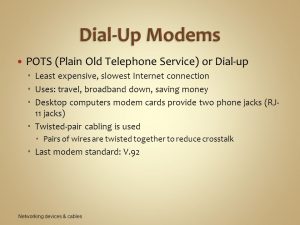Fixed versus Mobile
Okay I am going to say something that you may have to search for online. Nothing strange but some stuff that is going to date me. Like I can remember rotary dial telephones. Fax machines. Party lines. Switchboards – well maybe not switchboards but you get the general idea.
Now fast forward to 2019. We have tablets with Wi-Fi, the Cloud and smart phones. So do we even need the landline any more? Or are they going to go the way of the dodo bird?
At the speed of…

Least expensive, slowest Internet connection. Uses: travel, broadband down, saving money. Desktop computers modem cards provide two phone jacks (RJ-11 jacks) Twisted-pair cabling is used. Pairs of wires are twisted together to reduce crosstalk. Last modem standard: V.92. Networking devices & cables.
There are times when I am clicking on a link and it takes a few seconds to load. Oh no! Far too long! Something must be wrong!
Then I think back to WebCrawler (https://en.wikipedia.org/wiki/WebCrawler) that I used long ago. With a blistering 2600 bytes per second it took some time to view anything. My colleagues in the Geological Survey of Canada would give me a call on the landline phone. I would walk across from the lab I was into their office where we would watch the picture render line by line. We would sometimes take a coffee break (or smoke break – yeah it was more accepted back then). So I think I can handle a few seconds nowadays.
Landlines were the technology of that time. Later modems would become faster as technology improved. The old style `brick’ mobile phones would eventually shrink to become cellular phones. And now we have the latest incarnation of telecommunication, the smart phone.
Wireless Office? Sort of…
One thing that government departments constantly do is try to find cost savings. Of course, finance has no problem with slashing head count but that tends to bite the departments on all levels.
Somebody had the `brilliant' idea of `hoteling’ (https://en.wikipedia.org/wiki/Hoteling). If you ever want to see office morale of government employees sink faster than an open concept style (http://fortune.com/2016/05/12/the-open-office-concept-is-dead/) be our guest.
I work with IT, GIS and maps. It is kind of hard to carry my office space with me using public transportation. Carrying a map case that resembles a rocket launcher tends to make people nervous.
Telecom Hybridization
Now I am not saying that my office space is perfect. It is far from it. I work on site and at the main office. My VoIP phone is at the main office. My landline phone on site demonstrates how gravity works 24/7. I am not a supervisor therefore I am not issued a smart phone.
So let’s look at it this way. The VoIP phone runs via the government network. No separate phone line needed. The laptop is Wi-Fi enabled, and can operate anywhere on a government site or off site. But I sometimes travel to non-government sites where I must use my own personal cellphone for service. At the end of every month I receive a report on my having a landline phone – wait a minute? Still?
Change is good
So I suggest a shift. Ditch the landline phones and get rid of the monthly bill sent to your department. If that is possible. Go over your current contract with your providers. You already give them loads of money so you should have leverage.
Then cut the tether. Give each employee a smart phone for communication purposes, Do it correctly and you should see cost savings. Especially if your provider can set them up with personal versus government plans.
If anyone has already done this and has metrics, I would love to chat!
Cheers and enjoy your newfound mobility.




Leave a Reply
You must be logged in to post a comment.